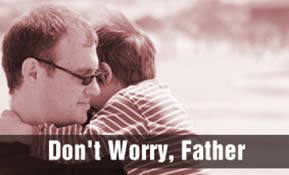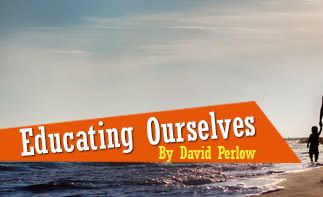
On the Playing Field
Children who come from a close and stable family unit are more likely to have strong self-esteem, they are therefore statistically more likely to succeed...

Our relatively late and seemingly sudden adoption of an “ultra” orthodox Torah lifestyle threw all those around us and took them by surprise. The rapid outward transformation belied an even deeper introspection, and while many felt that my husband and I had changed  for the better, the general consensus was that for the kids’ sake we could have slowed down a little….
for the better, the general consensus was that for the kids’ sake we could have slowed down a little….
Our parents concerns increased as we tentatively made new and seemingly extreme demands on their loving gestures as grandparents. Imagine the thin ice we delicately trod on to explain why certain gifts, books, clothes, food and even home accessories were no longer suitable for their grandchildren. I don’t know for whom this adjustment period was harder, them or us.
A main sticking point for our loving parents is how we may be limiting our children’s intellectual growth. How so? Because we no longer have television or radio in our home, do not read newspapers, popular magazines or secular books, or watch movies; we do not allow the children access to the computer (which we both use for work), on top of which we ‘restrict’ their dress codes, books, games, food, and entertainment, and, ‘worst’ of all, most of their schooling focuses on Torah. Sounds cruel in print, doesn’t it?
I’d like to explain why these changes have not limited the lives of our children, but rather have enhanced them greatly. Even more importantly, our new lifestyle, specifically, has bought us closer as a family. At first I thought it was an indirect consequence. Now I realize that it is indeed the intended goal.
What has been an eye-opener for me, is seeing how parents and children living a Torah lifestyle are all on the same playing field. What does this mean? It means that instead of our children gradually becoming more distant from us due to a widening generation gap: differing lifestyles, tastes, behavior and social codes, not to mention morals; we are now operating on the same plane as our children, and not some distant adult-sphere. This is because we are all following the same laws. Not the parents’ law, but Torah Law. Torah Ethics. Torah behavior and social codes. Learning the same. Practicing the same. Living the same.
Torah Law binds our family together, both in practice and in theory. Rather than ‘destroying’ our children, a Torah lifestyle, complete only with constant work on our emunah, breeds a deep-seated sense of family unity and a unique connection between parents and children. And since children who come from a close and stable family unit are statistically more likely to have strong self-esteem, they are therefore statistically more likely to succeed in their life choices, no matter what those choices are.
Let’s take a look at some of the daily applications of the ‘even-playing-field’ theory. Here is an example of a conversation that might be heard at our dinner table:
Big Brother: Daddy, we just started learning Sefer Mishpatim…
Younger Sister: So what?! We just finished it! Hmmf!
Big Brother: Yeah, whatever. I bet you didn’t learn it like we do, with all the commentaries…
Younger Sister: So? I’m only in third grade, wait ‘til next year….
Father: SOOOO, does anyone want to hear what I learned today?
Chorus: YEAHHHH! A story!!!!
Father: So, to continue with The Prophets, King David is in the desert…
Little Brother: Our Rebbe told us a story about King David! Can I tell?
Could there be a clearer picture? In a Torah household, everyone is often, literally, on the same page! Imagine the pride a five-year old feels to know that he is learning the same thing as his father. Or the confidence a 10-year old boy gains from explaining the details of a relevant law. And a girl who, at 8 years old, can hold her own in a Torah discussion with her parents. OK, admittedly they are still fighting constantly with each other, but since our sages argued their way through the Talmud, I’m not overly concerned. More importantly, a large part of their education is put into family practice on a daily basis, which is an incredible real-time reinforcement of important values: and an invaluable resource for self-confidence. When our children go to school, they are learning, literally, how to live their lives, right now. And I’m learning a lot from my children, Baruch Hashem!
Now picture this. We put on some music. We all sing together, and we often know all the words since they are usually taken straight out of our daily liturgy. Even if I can’t stomach techno-trance: I’m in awe that my son is dancing around the house shouting out lyrics from the Psalms, no less, at the top of his voice, splitting the Heavens as well as my eardrums. Not to mention my bliss when he raps to words of Torah instead of the usual gutter language that goes with hip-hop territory. And I can’t express my joy enough to Hashem when I open a bedroom door, and see children playing with Lego and chanting Shabbat songs softly together, instead of say, Justin What’s-his-name.
Whoa, stop right there. Someone might think that my family is perfect! Don’t worry, sometimes I open a bedroom door to see the same angelic Shabbat-song-singing children THROWING Lego at each other. My point is: between the fighting, name-calling and regular rough-housing: we have a lot more in common with each other than we did before we became Torah observant, which makes the good times that much better, and resonate that much more strongly.
Imagine a daughter who wants to dress like her mother. No big deal these days, perhaps, since mothers try to dress like their daughters. But it’s a big deal when the mother dresses modestly. My daughter has witnessed my transformation from an over-styled, overgrown 35-year old teenager to a modestly attired mother a few years later. I know she is happy with the way I look, because I get a subtle once-over of approval before we leave the house, and she proudly takes my hand as we hit the street.
In the Torah world, dress is very symbolic. From young girl through to married woman, boy to married man, important gender-specific clothing is often acquired with marriage, and therefore eagerly awaited: which in turn sets in place healthy and wholesome aspirations to marriage and family. We are partners in style, my daughter and I, as I button her up in all the right places, and she doesn’t protest since I am ‘walking the walk’. The same can be said for my older son, who openly states how he can’t wait to dress like his father, and, even more incredibly: how he can’t wait to BE a father, and he’s only ten! During Purim, it’s commonplace in our parts to see children dressing up as mothers and fathers. In my old home town, sadly, even before our teshuva days I didn’t let my kids out of the house during the Purim Parade. Those ‘queens’ had nothing to do with Queen Esther….
Now all of this is not exclusive to an ultra-orthodox lifestyle. I grew up in a traditional home, and the same effect transpired: we were at our closest as a family when practicing our Judaism: Shabbat, the Jewish holidays, and family simchas. In fact, when my father wanted to unite a disparate dinner table, he would suddenly shout out: “QUIZ!”. It would always be a topic that we all knew about and could contribute to, no matter what age: Jewish general knowledge. He even used to pick up the Shulchan Aruch at the Shabbat table and read from it randomly, and we would all stop our shenanigans and listen, enraptured. I have adopted this wonderful idea for my kids, too, for those out of control moments when everyone seems to be running in a different direction armed with weapons of mass domestic destruction …. “QUIZ!!!!” The point is that our Jewishness is what unites us even more than our genes. When intertwined with our daily lives, no matter how or how much, the results are far-reaching.
All of this is fine and wonderful in showing how a Torah lifestyle has not in the least affected our children’s lives negatively. But what has all this got to do with their intellectual development? Perhaps I should ask this question in the reverse for more impact. How does watching movies and television, being trendy, reading comics and teen fiction, playing computer games, eating and wearing whatever you want and hanging out with the opposite sex enhance a child’s intellectual development?
There. I said it.
The only thing I haven’t addressed yet is the issue of an almost exclusive Torah education with a very limited secular need-to-know-only-basis curriculum. That is a very hot and detailed topic and deserves an article of it’s own. Again, some things are better addressed in the reverse. As I like to tell people: all the art, music, drama, languages, science, tennis, athletics, swimming, team sports, public speaking, dancing, debating , performing, composing and an entire bookshelf of awards – let me catch my breath – did not make me a better person, or better equipped to deal with life. Emuna did all that.
I did not learn my work ethic at school, which made me a top employee for many years. I learned it from my parents. I did not learn my respect for others at school, I learned it from my parents. I did not learn my thoughtfulness, or sensitivity, or attribute of giving at school. I learned it all from my parents. And all of that, I got from Hashem. Suffice to say, that the ingredient necessary to be successful in life is a stable home. The best way to have a stable home is to cultivate the unity and identity of the family. Those statistically with the strongest family units and identity are those with strong cultural ties embedded within a loving family environment.
If you ask me, a Torah lifestyle jam-packed with emuna is a sure-fire, blue-chip investment in our children’s secure future, both in this world and the next.







5/18/2011
Would like to see a follow up article on the topic of education Could you address the "very hot and detailed topic" of education. For example, if scienice is in the "not-need-to-know" category, why do we use cell phones, microwaves and computers, drive cars, and use the advances of modern medicine?
5/18/2011
Could you address the "very hot and detailed topic" of education. For example, if scienice is in the "not-need-to-know" category, why do we use cell phones, microwaves and computers, drive cars, and use the advances of modern medicine?